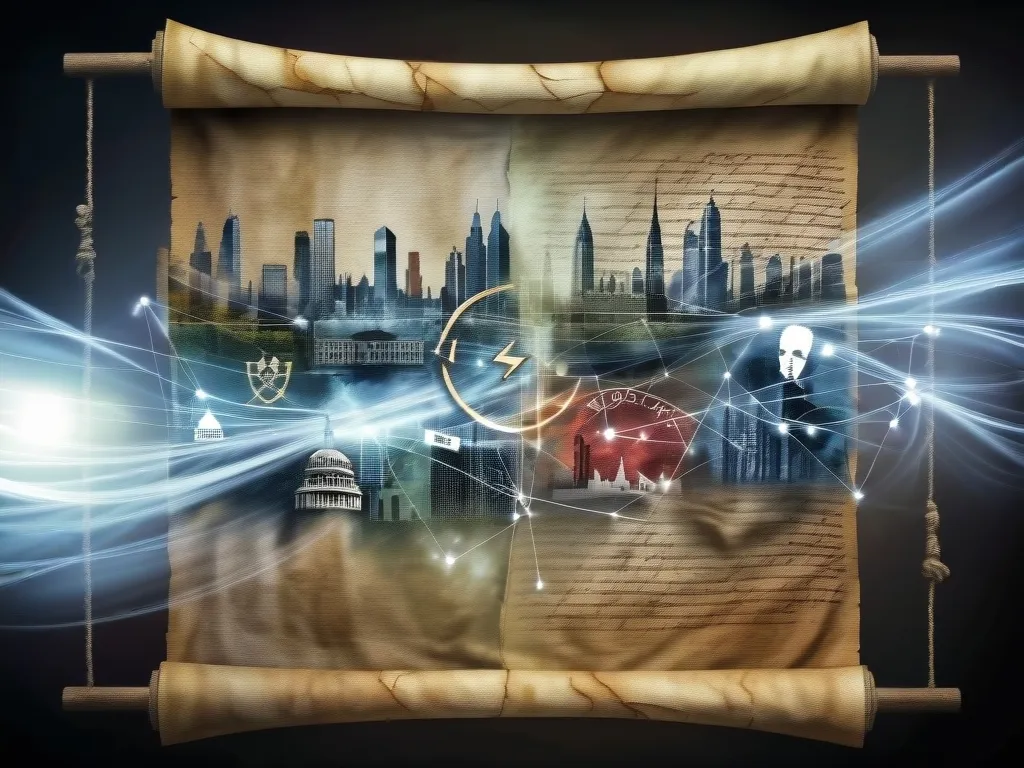As we navigate the complex landscape of modern governance, it’s fascinating to explore how ancient prophecies and religious predictions continue to influence political strategies and decisions. This intersection of spirituality and politics is not just a curiosity; it has real-world implications that shape public opinion, international relations, and even legislative changes.
One of the most striking examples of this phenomenon can be seen in the United States, particularly within the evangelical community. Here, biblical prophecies about the end times and the Second Coming of Christ are often interpreted as guides for current events. For instance, many evangelicals believe that God has revealed his plans for the future through prophecy, with a significant portion of Americans – around 37% – agreeing that God has shared his future plans with humans through prophetic revelations.
This belief system has profound implications for politics. During the presidency of Donald Trump, for example, some evangelical leaders portrayed him as a divinely anointed leader, likening him to King Cyrus from the Bible, who was tasked by God to enable the Jews to rebuild the Temple. This narrative was popularized by figures like Lance Wallnau, who advocated for the “7 mountains mandate” – a call for Christians to dominate key areas of society, including government, education, media, and entertainment. Such beliefs not only influenced Trump’s support base but also shaped his policies, particularly in areas like multilateralism and global health crises.
The COVID-19 pandemic served as a stark example of how these prophetic interpretations can influence policy. Many evangelicals saw the pandemic as a divine warning or a fulfillment of biblical prophecies, urging Americans to return to God. This worldview was reflected in the policies of the Trump administration, where members of the White House Evangelical Advisory Board, such as Ralph Drollinger and Paula White, interpreted the pandemic through a biblical lens. Drollinger, for instance, suggested that the pandemic was a punishment for America’s moral decay, while White drew parallels between the pandemic and biblical plagues.
This fusion of prophecy and policy is not limited to domestic issues. International relations are also significantly impacted. For example, the strong support of Israel by American evangelicals is often rooted in dispensationalist theology, which believes that the establishment and protection of Israel are crucial for the fulfillment of end-time prophecies. This has led to a close alliance between American evangelicals and Israel’s hard-line political parties. During the presidency of George W. Bush, this alliance was particularly evident, with Bush’s administration being influenced by evangelical views that were skeptical of international peacekeeping efforts and the United Nations.
The influence of prophecy on politics can also be seen in the way it shapes public opinion and legislative agendas. In the United States, evangelicals have been a driving force behind several policy debates, ranging from sexual and reproductive health to environmental policies. Their interpretations of biblical prophecies often lead them to oppose multilateral solutions to global problems, preferring a more isolationist approach that aligns with their eschatological views.
However, it’s important to note that not all evangelicals share the same views on prophecy and politics. There is a significant divide within the evangelical community, with some groups opposing the dominant conservative stance. For instance, magazines like Christianity Today and Sojourners have critiqued Trump’s policies from a more liberal evangelical perspective, highlighting the diversity within the evangelical movement.
The intersection of prophecy and politics is not unique to the United States or Christianity. Across various cultures and religions, leaders have long consulted spiritual texts to guide their decisions. In Israel, for example, the relationship between religious prophecy and political policy is deeply intertwined. The dispensationalist doctrine, which predicts a final conflict in the Middle East involving Israel, has made many American evangelicals wary of peace agreements that involve territorial concessions. This has led to tension between Israeli leaders who seek peace and the evangelical community that fears such agreements might thwart God’s plan.
In a broader sense, the politics of Jesus himself offers a compelling example of how spiritual leadership can challenge and redefine political power. Jesus, who was expected to be a political king by many of his contemporaries, instead turned the traditional notion of kingship on its head. He advocated for loving enemies, standing with the marginalized, and not seeking power for its own sake. This approach, while not directly influencing modern governance in a literal sense, provides a profound alternative to the typical power dynamics seen in politics.
As we reflect on the role of prophecy in modern governance, it becomes clear that these beliefs are not merely fringe elements but rather a significant part of the political landscape. They influence how leaders frame their policies, how public opinion is shaped, and how international relations are navigated. Understanding these dynamics is crucial for anyone seeking to grasp the full complexity of modern politics.
In my own journey through this topic, I’ve been struck by the sheer diversity of beliefs and the ways in which they intersect with political life. From the charismatic prophets who see Trump as a divinely appointed leader to the evangelical critics who argue for a more nuanced approach to policy, the landscape is rich with varying perspectives.
Ultimately, the fusion of prophecy and politics reminds us that governance is never just about policy and strategy; it’s also about the deep-seated beliefs and values that drive human action. As we navigate this intricate world, it’s essential to approach these topics with an open mind and a willingness to understand the multifaceted nature of human belief and political action.
In conclusion, the influence of prophecy on modern governance is a multifaceted and deeply ingrained aspect of our political world. It shapes policies, influences public opinion, and guides international relations in ways that are both visible and subtle. As we move forward, recognizing and understanding these dynamics will be crucial for building a more informed and empathetic global community.






